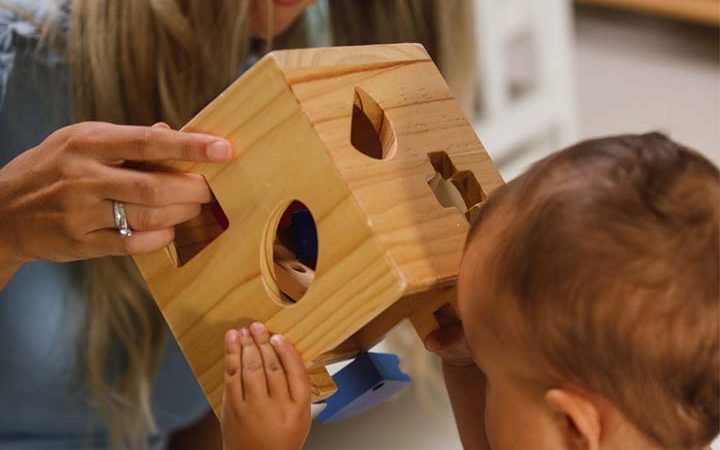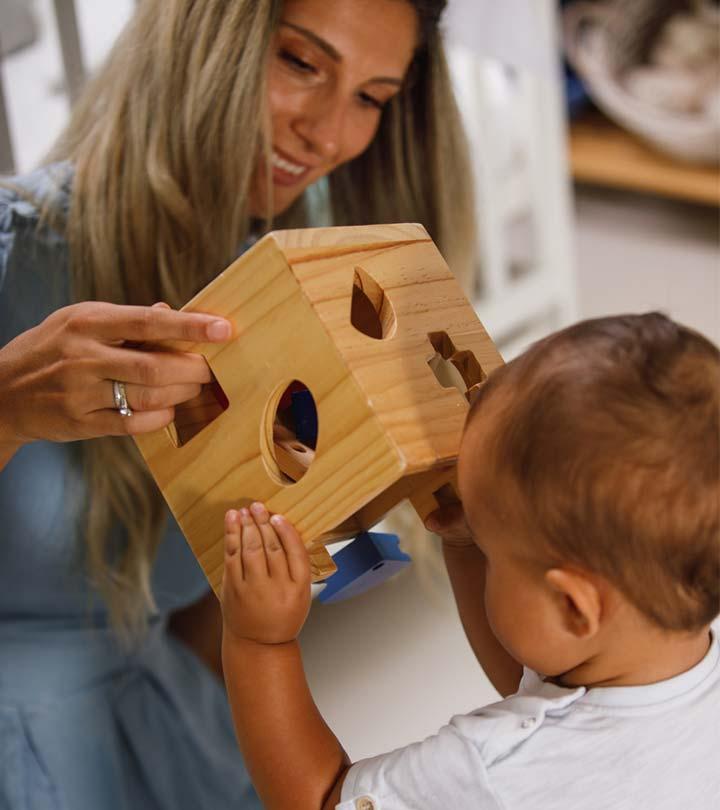Your baby’s cognitive development occurs when they interact with their environment (1). Every interaction creates new nerve connections and pathways.
Cognitive development in infants occurs when they use their senses and curiosity and reach out with their hands to touch and feel things (2). In the first year, babies also understand language and develop feelings and bonds of love and trust.
Parents play an important role in a child’s cognitive development. For example, how parents speak to their babies, hold and cuddle them, or play with them can go a long way in their cognitive development (2).
Many theories of cognitive development put forth by scientists such as Jean Piaget, Erikson, Bronfenbrenner, and others give a deep insight into a child’s cognitive development. Let’s look at some activities that can help in cognitive development of your infant.
10 Cognitive Development Activities for Infants
Every child is different and reaches their developmental milestones in their own time. These activities can help boost your infant’s cognitive development at different ages.
Cognitive activities for infants 0 to 3 months
A newborn baby is able to see objects around 12 inches from them, is sensitive to sounds nearby, and startles when they hear loud noises by kicking their legs, flailing their arms, and arching their back (3).
From one to three months of age, your child should be able to move their eyes as objects move, respond to startling and loud noises, follow objects such as rattle toys, recognize familiar people from a distance, and cry or fuss when they are bored or want to communicate. During their third month, an infant can recognize their mother’s breast or bottle when it is feeding time and learn to follow moving objects or people by turning their head.
Here are some cognitive development activities that are apt for infants:
1. Read to your infant
Reading to your baby has many benefits, and it is never too early or late to start. Children benefit from being read to from a very young age (4). Reading to your newborn helps them recognize voices, sounds, and showing them picture books with bright colors helps in their cognitive development.
2. Talk to your baby
At 0 to 3 months of age, your baby is way too young to speak or converse with you. However, you may try talking to your baby, look at them and smile, and have regular conversations with them. Notice how your baby will listen to you intently.
Having conversations with your baby and talking to them helps them develop language and communication skills (5). Your baby may also respond to you by cooing or making noises.
3. Hang a moving rattle over their crib
Hanging a moving rattle over your baby’s crib or within their reach during tummy time encourages them to reach out for it. This helps them move their hands and legs while enabling them to hold their head (5).
4. Sing to your baby
Singing to your baby has multiple benefits for your baby. It helps in the development of a bond between you and your baby, teaches them new words and rhythms and improves their listening skills–all of which help in their cognitive development (6).
Cognitive activities for infants 3 to 6 months
By the time your baby turns four or five months old, they develop a sense of self-discovery. They begin to understand that they can influence their surroundings and are able to appreciate interactive toys.
At this age, your infant is also able to communicate if they are happy or sad, looks at you when you are feeding them, and reaches for toys and other objects with their hands. By six months of age, your infant is also able to transfer objects from one hand to the other and reach for things around them.
Try these cognitive development activities for this age group.
1. Encourage object play
When your infant turns around four to five months of age, they begin to understand ‘cause and effect’ in play. They learn to drop things on purpose and observe your reaction. Give them objects such as small boxes, balls of different sizes, spoons, plastic cups, etc., to encourage object play.
2. Provide age-appropriate interactive toys
Once your child is acquainted with the cause-and-effect relationship of certain activities, it is a good time to introduce age-appropriate interactive toys that follow this principle. For example, introduce them to interactive toys that have a button that opens a door or creates music, and the like. Seeing the result of the action. Such as when they press a button, can strengthen your baby’s self-confidence.
3. Introduce them to different textures
As your child begins to use their hands more for holding objects or reaching out for them, introduce them to different types of textures such as wool, velvet, and corduroy in the form of textured balls or activity boards meant for this purpose (7). Allow them to play with different types of objects and textures and understand them in their own way.
Cognitive activities for infants 6-12 months
Between six and twelve months of age, an infant’s cognitive abilities develop rapidly and they can use their hands more, transfer objects between both hands, turn book pages, look for objects that you hide, put and pull out things from containers, make sounds using objects they have, and understand simple commands (3).
Some activities that can help boost your infant’s cognitive abilities in this age span include
1. Stacking
A stacking game is great for infants between six and twelve months of age. You can get different types of stacking cups or containers. Teach your infant how to stack objects.
You can also play a stacking game where both of you may stack objects at the same time. Apart from learning the cause-and-effect concept, your child also develops fine motor skills through this activity.
2. The disappearing Cheerio
At around seven to eight months of age, infants learn the concept of object permanence as per Jean Piaget’s theory (8). This concept posits that the object exists even when it is hidden. The disappearing cheerio and peek-a-boo are good games to help your infant develop this concept. These activities develop attention skills, memory, and object permanence in your infant.
3. Container play
As your child begins to sharpen their grabbing, gripping, and motor skills, give them different toys in a container. Your infant may reach out for a few toys or overturn the entire container and observe the toys falling out or producing rattling noise.
Make this a habit every day and allow your infant the independence to pick out toys they would like to play with. As your infant grows older, you can teach them to put the toys back into their containers. Any type of container play is intriguing for an infant and boosts their cognitive abilities.
Children grow rapidly in their first year. Every month, you can observe them reaching some milestones. Parents may try various cognitive activities for infants to improve their learning and development.
References:
MomJunction’s articles are written after analyzing the research works of expert authors and institutions. Our references consist of resources established by authorities in their respective fields. You can learn more about the authenticity of the information we present in our editorial policy.
The following two tabs change content below.
Dr. Meenakshi is a dentist and a passionate writer with over eight years of experience in dentistry and four years in writing. She started her career as a dentist with a dental chain in Mumbai and soon rose to lead the clinic as a Head Dentist. She then switched to working for two start-ups in healthcare, before beginning her own solopreneur journey as the writer that she is today.For MomJunction, she writes health, wellness, well-being articles on babies and kids. She loves working on different types of articles on a flexible schedule.Dr. Meenakshi did her Bachelors in Dental Surgery from Mumbai, India, and completed a management program (General Management for Healthcare Executives) from the prestigious IIM Bangalore. She also holds a Diploma in Creative Writing from IGNOU, Delhi.Reading on her Kindle, traveling with family and friends, enjoying gastronomic experiences, and watching scientific documentaries are her hobbies.



































